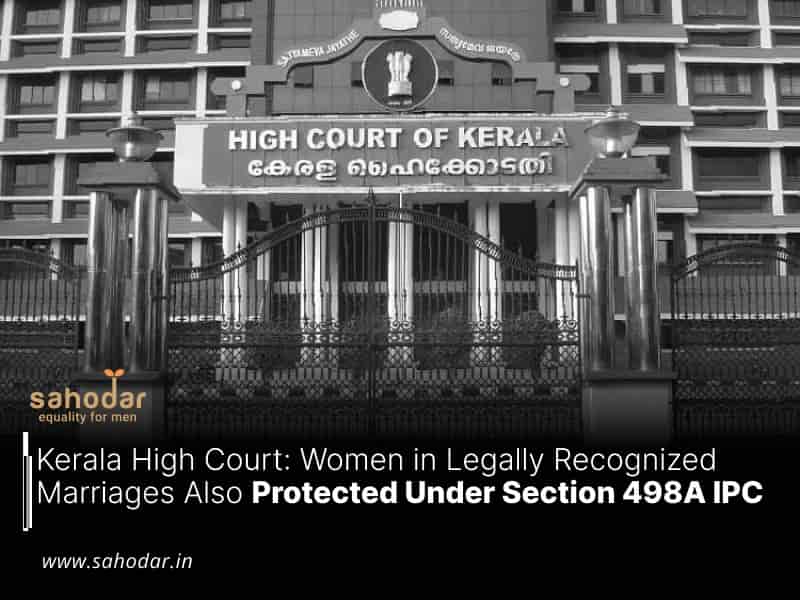The Court rejected an argument that Section 498A IPC could only be invoked by a “legally wedded wife.”
The Kerala High Court recently reiterated that a woman in a relationship that has the ‘semblance of a legal marriage’ under customary or religious law is also entitled to Protected under Section 498A of the Indian Penal Code (IPC), which addresses cruelty towards married women.
Justice Sophy Thomas made this remark while presiding over a case in which a man and his family were accused of driving his 18-year-old wife to suicide shortly after their nikah (Muslim marriage contract).
The accused argued that the marriage in this case did not qualify as a valid legal union, and therefore, Section 498A could not be applied. They contended that only a “legally wedded wife” is entitled to Protected under Section 498A.
The Court disagreed with this argument. Citing a previous High Court decision in Narayanan v. State of Kerala, the Court ruled:
“If there was some form of marriage, religious or customary, which has the colour of a legal marriage, then also the woman can seek protection under Section 498A, though later, for some reason, that marriage is found to be invalid in the eye of law.”
The Court also referenced the case of Reema Aggarwal v. Anupam & Ors., where the Supreme Court ruled that a marital relationship, even if its legality is disputed, does not prevent the application of Section 498A IPC if cruelty can be proven.
The case involved an appeal by four individuals (the deceased woman’s husband and in-laws), who had previously been convicted by a trial court under Section 498A IPC for allegedly driving the 18-year-old woman to suicide in 2002.
The woman had converted from Hinduism to Islam and married the accused man (the first accused) after their relationship was discovered by their families. The relationship was revealed when the woman was under 18 years old.
The Court was informed that religious leaders from both communities intervened in the matter, and it was ultimately decided that the woman would convert to Islam and marry the first accused once she turned 18.
After receiving Muslim religious teachings, a nikah was performed between her and the first accused once she turned 18.
The prosecution claimed that following the nikah, her husband and in-laws subjected her to both physical and mental abuse, including dowry-related cruelty, which eventually led her to take her own life.
The husband and in-laws were initially charged with offences under Sections 498A (cruelty by husband or his relatives), 304B (dowry death), and 306 (abetment of suicide) of the IPC.
However, the trial court acquitted the accused of charges under Section 304B and Section 306 due to lack of sufficient evidence. Nevertheless, they were convicted under Section 498A IPC for cruelty and sentenced to three years of rigorous imprisonment along with fines.
The accused (appellants) appealed the trial court’s conviction and sentence before the High Court.
Among other arguments, the appellants contended that there was no legally valid marriage between the deceased and the first accused, as their relationship was based on a marriage agreement rather than registration under secular law.
The Court rejected this argument, stating that if a union has the appearance of a legal marriage, a woman can seek Protected under Section 498A IPC, even if the marriage is later declared invalid due to factors such as age, mental capacity, religion, consanguinity, or an existing spouse
The Court stated that such marriages should be regarded as valid between the parties for all practical purposes unless one party challenges it and it is declared void on valid grounds. In this case, the Court noted that the marriage had never been legally contested.
The High Court upheld the trial court’s conviction, noting that testimonies from the deceased victim’s father, friends, and neighbors supported the allegations of physical and mental abuse against the appellants, including claims of dowry demands and physical mistreatment.
The Court acknowledged that these crimes were serious, but also noted that the offence occurred in 2002, nearly 22 years ago, and that the deceased woman’s husband was only 19 years old at the time.
Considering this, the Court decided to reduce the jail sentence for the appellants.
The sentence for the husband and his mother was reduced from three years to 1.5 years of imprisonment, with each fined ₹25,000. The father-in-law and brother-in-law received a reduced sentence of four months in prison and were each ordered to pay a ₹10,000 fine.
The Court also ordered that ₹50,000 from the fines be paid as compensation to the victim’s father or his legal heirs.

